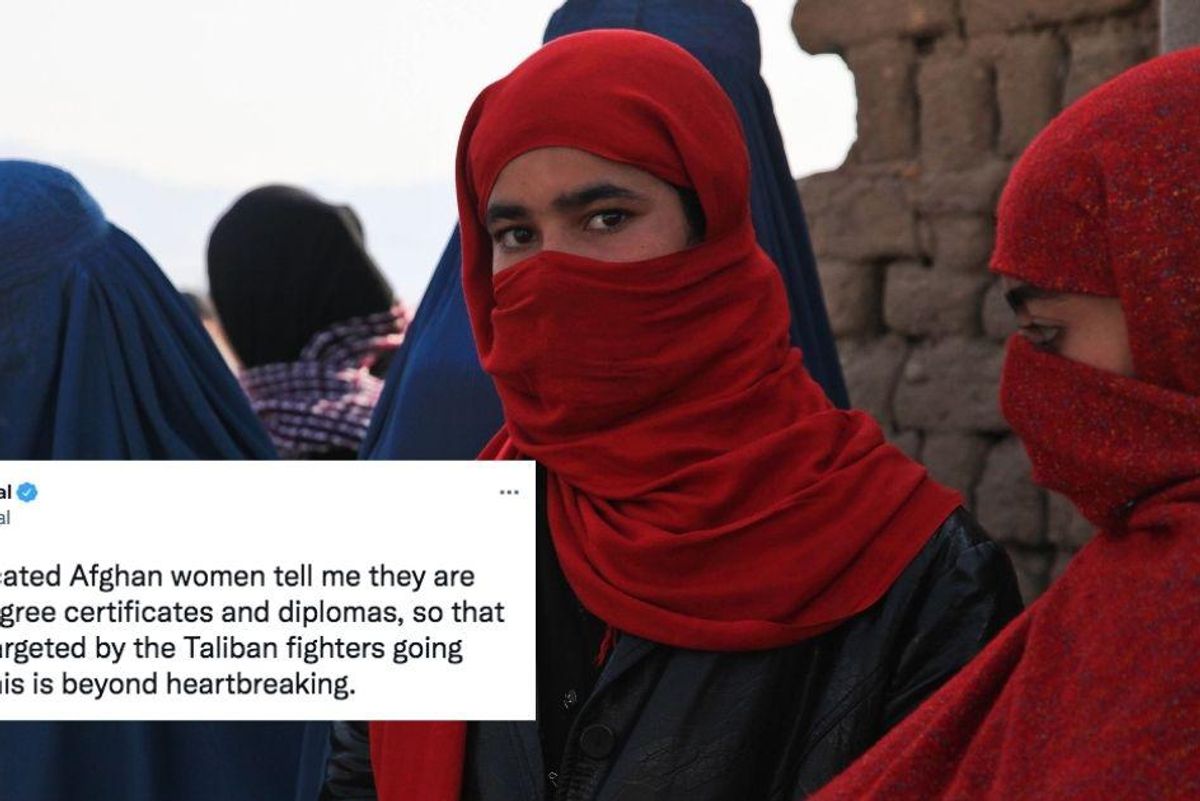In October 2019, I sat at a table in Jakarta interviewing a young Afghan woman about the plight of refugee women in Indonesia. Her family had fled the Taliban when she was a child, and now she's stuck in a life of limbo in Jakarta with little hope of change.
By practically every measure our lives are nothing alike, yet I felt connected to her immediately. She was brilliant and eloquent (in English, no less), with a keen passion for justice and equality.
But mostly she was just so fully and beautifully human. The only real difference between us was that I was born inside certain man-made borders and she inside different ones. Neither of us chose our life circumstances. The happenstance of my birth did not make me more deserving of the freedom and privileges that lay unjustly out of her reach.
When we hugged goodbye, I wished I could take her back to the U.S. with me. I lamented that the Trump administration had slashed our refugee admissions ceiling to historic lows and thought of the countless women like her, overflowing with potential that might never be realized because of where they were born and the rules out of their control.
Her face flashed before my eyes as the news of the Taliban taking over Afghanistan after U.S. military withdrawal broke. Women and girls like her will surely bear the brunt of the fallout. We're already seeing heartbreaking stories of women burning the diplomas and degrees they have earned, fearing a life of extremist oppression, watching their hopes and dreams destroyed overnight. There were already Afghan refugees scattered in camps and stopover countries throughout the world, waiting for a chance to build a life for themselves—and now there will be thousands more.
Young and educated Afghan women tell me they are burning their degree certificates and diplomas, so that they won't be targeted by the Taliban fighters going door to door. This is beyond heartbreaking.— Amruta Byatnal (@Amruta Byatnal) 1629125669
Women and girls have always paid a high price in men's wars, but rarely is the price as visible as it is in Afghanistan. We know what Taliban rule means for women and girls there and we can't in good conscience just walk away and do nothing to help them.
If you feel compelled to do something, here are a few options:
1) For help on the ground right now, consider donating to organizations that have a strong track record of helping Afghan women and girls.
- Women for Women International is a non-profit organization that provides aid and support to women in war-torn countries. Women for Women has long had a presence in Afghanistan and their Stronger Women, Stronger Nations program has proven to have a significant impact in the country. A donor has promised to match up to $500,000 for the emergency aid fund in response to the humanitarian crisis unfolding there. Learn more and donate here.
- Women for Afghan Women is a grassroots civil society organization that "works to help Afghan women and girls exercise their rights to pursue their individual potential to self-determination, and to representation in all areas of life—political, social, cultural, and economic." With offices in Afghanistan and New York, they assist disenfranchised Afghan women both in Afghanistan and the U.S. Learn more and donate here.
2) For help in the long run, ask the U.S. government to increase the refugee ceiling back to historic norms at minimum.
While the Biden administration increased the number of refugees the U.S. would accept this year from 15,000 to 65,000, that's still far lower than the numbers the U.S. has historically welcomed. (To be clear, the refugee resettlement program is separate from the asylum-seeking we see at the southern border.) Refugees are the most vetted group of people to enter the U.S., they are statistically more likely to start businesses than native-born residents and other immigrants, they overall have a positive impact on the economy, and logic would tell us that displaced people are likely to be grateful and loyal to a country that offers them safe haven and opportunity. Refugee resettlement is good for the U.S. in addition to being the right thing to do.
Sign the International Rescue Committee petition to raise the refugee ceiling here.
Let's add our financial resources and civic voices to our thoughts and prayers for the women and girls of Afghanistan, as well as all of those facing oppression under the Taliban regime. While pundits play political football over who is to blame for the mess, let's put our focus on helping those who are most impacted by it.
- Millions of refugees live in limbo. Here's one initiative offering hope ... ›
- Setting the record straight on what it's really like to host a refugee ... ›
- 3 things President Obama said about refugees that we all need to ... ›
- Meme artist raises $550,000 in just one hour to rescue Afghans on the Taliban's kill list - Upworthy ›
- Meme artist raises $550,000 in just one hour to rescue Afghans on the Taliban's kill list - Upworthy ›
- Meme artist raises $550,000 in just one hour to rescue Afghans on the Taliban's kill list - Upworthy ›
- Meme artist raises more than $2 million in 5 hours to rescue Afghans on Taliban kill list - Upworthy ›
- Where do Afghan refugees go? - Upworthy ›

